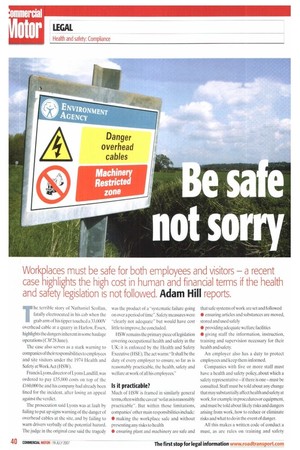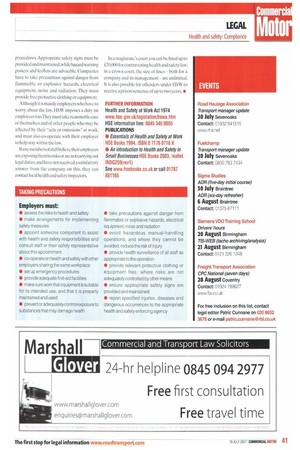Workplaces must be safe for both employees and visitors —
Page 40

Page 41

If you've noticed an error in this article please click here to report it so we can fix it.
a recent case highlights the high cost in human and financial terms if the health and safety legislation is not followed, Adam Hill reports.
The terrible story of Nathaniel Scollan, fatally electrocuted in his cab when the grab arm of his tipper touched a 33,000V overhead cable at a quarry in Harlow, Essex, highlights the dangers inherent in some haulage operations (CM 28 June).
The case also serves as a stark warning to companies of their responsibilities to employees and site visitors under the 1974 Health and Safety at Work Act (NSW).
Francis Lyons, director of Lyons Landfill. was ordered to pay £35,000 costs on top of the £160,000 he and his company had already been fined for the incident, after losing an appeal against the verdict.
The prosecution said Lyons was at fault by failing to put up signs warning of the danger of overhead cables at the site, and by failing to warn drivers verbally of the potential hazard. The judge in the original case said the tragedy was the product of a -systematic failure going on over a period of time Safety measures were "clearly not adequate" but would have cost little to improve, he concluded.
HSW remains the primary piece of legislation covering occupational health and safety in the UK; it is enforced by the Health and Safety Executive (HSE). The act wams:"It shall be the duty of every employer to ensure, so far as is reasonably practicable, the health, safety and welfare at work of all his employees" Is it practicable?
Much of I ISW is framed in similarly general tenns,often with the caveat "so far as is reasonably practicable". But within those limitations, companies' other main responsibilities include: • making the workplace safe and without presenting any risks to health • ensuring plant and machinery are safe and that safe systems of work are set and followed • ensuring articles and substances are moved, stored and used safely • providing adequate welfare facilities • giving staff the information, instruction, training and supervision necessary for their health and safety.
An employer also has a duty to protect employees and keep them informed.
Companies with five or more staff must have a health and safety policy, about which a safety representative —if there is one — must be consulted. Staff must be told about any change that may substantially affect health and safety at work, for example in procedures or equipment, and must be told about likely risks and dangers arising from work, how to reduce or eliminate risks and what to do in the event of danger.
All this makes a written code of conduct a must, as are rules on training and safety procedures. Appropriate safety signs must be provided and m ain tained , while hazard warning posters and leaflets are advisable. Companies have to take precautions against danger from flammable or explosive hazards, electrical equipment, noise and radiation. They must provide free protective clothing or equipment.
Although it is mainly employers who have to worry about the law. 11SW imposes a duty on employees too.They must take reasonable care of themselves and of other people who may be affected by their "acts or omissions" at work, and must also co-operate with their employer to help stay within the law.
If any members of staff believe theiremployers are exposing them to risks or are not carrying out legal duties, and have not received a satisfactory answer from the company on this, they can contact local health and safety inspectors. In a magistrate's court you can be fined up to £20,000 for contravening health and safety law; in a crown court. the size of lines both for a company and its management are unlimited. It is also possible for offenders under I I SW to receive a prison sentence of up to two years. •


























































































































































































